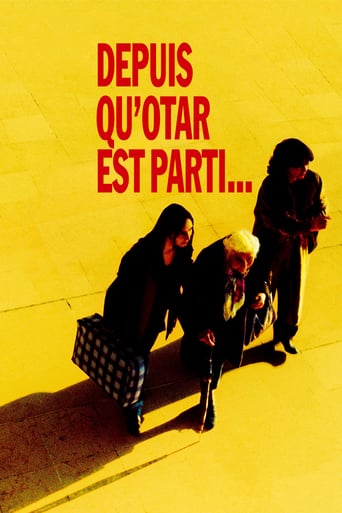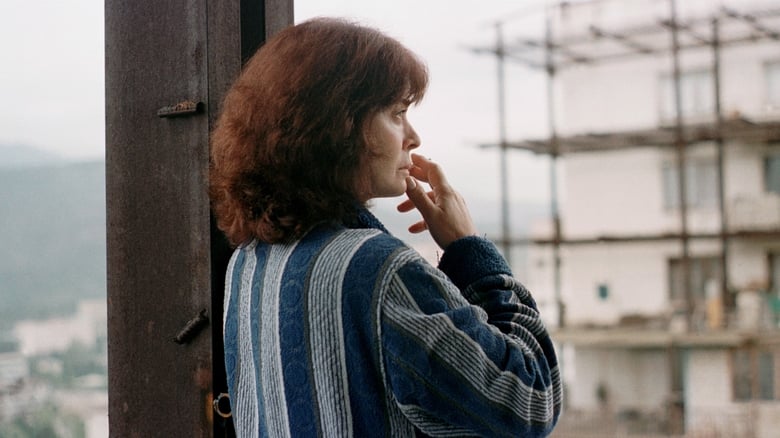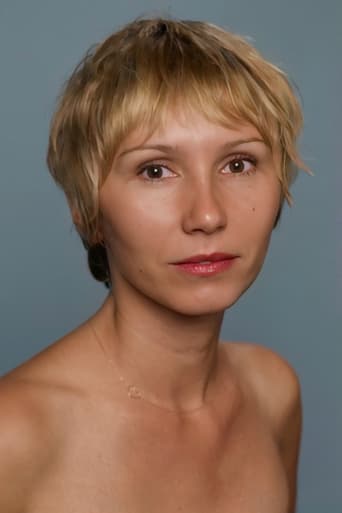Since Otar Left (2003)
The one joy in the lives of a mother and daughter comes from the regular letters sent to them from Paris from the family's adored son, Otar. When the daughter finds out that Otar has died suddenly, she tries to conceal the truth from her mother, changing the course of their lives forever.
Watch Trailer
Free Trial Channels
Cast


Similar titles
Reviews
The greatest movie ever made..!
It is a performances centric movie
The plot isn't so bad, but the pace of storytelling is too slow which makes people bored. Certain moments are so obvious and unnecessary for the main plot. I would've fast-forwarded those moments if it was an online streaming. The ending looks like implying a sequel, not sure if this movie will get one
I think this is a new genre that they're all sort of working their way through it and haven't got all the kinks worked out yet but it's a genre that works for me.
It is very difficult to define this film. In fact, every definition is fake because the essence of words or gestures is ineffable.Otar may be a type of Godot. The incarnated hope, the symbol of filling or image of any victim.The three women- variant of Tchekov's "Three sisters".But the reality is not so easy. In East Europe of Communist era, The Occident was the Heaven in all senses. It was the lost Paradis, the normality, the escape. A part of this wonderful world was shield against the daily nightmare. The fall of Communism was not the solution. Occident is a form of chimera not like education or mentality's result but like the personal treasure.The film is not a moral lesson or image of ex-Sovietic country in transition to European values. It is not an Andre Makine's page. It is only a short life's story and description of a subtle escape. It is slice of dream's rules, descending in past who remains only present and future.Esther Gorintin's acting is magnificent. A powerful character with a victim's mask, a fragile grandmother for who the life is not only fight or fear, past memories or sweet desire but a form of world's contemplation.In fact, Eka is the Ada's image. And Otar's death- solution of interior crisis of every character. The end of life in nostalgic universe.
There's very little to say about Since Otar Left, except that it is a radiantly human film, and all the more so for its modesty, its sense of proportion. It deals with a family that could be from almost anywhere on earth, but happens to be from The Republic of Georgia: the matriarch, Eka, waits patiently for letters from her son Otar, who lives in Paris; her daughter Marina sells off the family heirlooms one-by-one at a flea market, trying to keep up with the bills, while her granddaughter Ada yearns for better things. Eka is a stubborn old Stalinist - she still believes Stalin was a good man, The Father - but most of her faith is invested in Otar, a doctor, whose life in Paris seems scarcely more prosperous than that of Eka, Marina and Ada, who live together in a small apartment where the water and electricity are sometimes on. They live there surrounded by books, French books once owned by Eka's husband, who hid them from the police in the time of Stalin (they could sell them for a fortune but Eka refuses). Eka and Ada speak French to each other; for them France represents something better, and Otar's letters from France are their connection to that better place far from the troubles of daily existence (never mind that the same troubles exist everywhere). Bad news comes one day in the form of a phone call; Marina learns that Otar has been hurt in an accident, and she and Ada later discover that he has died. Believing her faith in Otar to be all that keeps the aged Eka alive, Marina and Ada conspire to hide the truth from her, concocting letters from Otar (Ada knows how to copy his handwriting). Eka doesn't seem to suspect the truth, but she's a cagey old bird, and decides one day to sell off the books at last and use the money to fly to Paris and see her son.There is nothing remarkable about Since Otar Left, and that is precisely what is remarkable about it. Melodramatic art is not employed in the name of making these characters seem more interesting than they are; it is a film of such maturity, such even-handedness that it makes conventional melodrama seem hyperbolic and hollow. Director Julie Bertucelli has an unemphatic approach to storytelling that's reminiscent of Iranian cinema; she might have studied at the knee of Jafar Panahi or Majid Majidi. The only thing she lacks compared to those giants of Iranian neo-realism is their sense of poetry. Since Otar Left is not as formidable a film as The Color of Paradise or Crimson Gold - it has the even-toned, humanistic feeling of an Iranian film while still being rooted in European naturalism. In other words it is not as mysterious as the works of Panahi or Majidi, it doesn't seem touched by the mystical. It lacks that other, hard-to-define dimension that takes the great Iranian works outside the realm of mere naturalistic film-making and into someplace almost cosmic - but this is no knock on Bertucelli, who has made an enchanting movie just by following her characters, by paying attention to the little details. She has created three memorable, keenly-observed characters, and has elicited a trio of fine, understated performances. Esther Gorintin plays Eka, the old peasant, with a poignant combination of frailty and toughness; her stooped, hunchbacked body seems fragile and sturdy at the same time, and she has a sneaky intelligence. Eka is both loved and resented by Marina, whom Nino Khomasuridze invests with a neurotic tension, the left-overs of some childhood competition with Otar over their mother's affection. In between the two combative women stands Ada, the very picture of youthful restlessness tempered with pragmatism. The actress who plays her, Dinara Drukarova, has the kind of face one might expect to see on the cover of a magazine, a mask-like, enigmatic face, and with it Drukarova projects both Ada's longing and her groundedness. Ada is closest to Eka - she's not afflicted with her mother's neurosis, but has inherited Eka's stolidness, her rock-like resolve. Julie Bertucelli defines these characters beautifully, their complicated relationships, and constructs around them a film that is as unassuming, as charming, as secretly complex as they are.
There is a famous photograph, taken in 1852, of three grieving British queens: dowager Queen Mary, Queen Mother Elizabeth, and the not yet crowned reigning Queen Elizabeth. They are mourning the death of King George VI -- a son, a husband, a father. They are clad in black from head to toe, veils and widow's weeds. They are stony-faced in their own individual grief, yet huddled together to give each other comfort."Since Otar Left" is like that: a portrait of three generations of grief, and how a Georgian grandmother, mother, and daughter evolve from handling that grief in their own way, to showing concern for the sadness and loss of the other two women.Of the three, middle-aged Marina is the most grounded in reality, no-nonsense, down to earth. She worries about the day-to-day things: how to keep body and soul together when her brother Otar dies and is no longer able to supplement the family's income. She worries about her mother's health, staying by her bedside and massaging her feet in a very physical and intimate expression of love and caring. She swallows her pride and borrows money from her erstwhile lover, an antiquities dealer, and even considers selling the leather-bound, gold-stamped volumes of French literature that are her father's legacy.Young Ada responds differently. At first, she is affected in a practical way: mourning makes it difficult for her to concentrate at school, and the loss of income from her brother causes her to resort to petty theft. But she uses her creativity and imagination, and draws inspiration from the same French literature that Marina wants to sell. Ada reinvents her dead brother and clothes him in the brightness of Paris, City of Lights -- the city to which he emigrated and in which he tragically died.Elderly Eka seems like a combination of the two. Like Marina, she is tough as nails. An early scene shows Eka relishing a rather large piece of cake, and bristling when Marina helps herself to a forkful. We see that, beneath her outward appearance as a kindly old lady with fine white hair, Eka can be petulant and stubborn. She has an iron will and a spine of steel. When she fails to hear from her son Otar for several months, she takes matters into her own hands and decides to go to Paris to find him. Eventually, she learns the truth that he is dead. We see her grief in her sad eyes and her suddenly tired old body. But then Eka surprises us by rising above her own bereavement and reaching out to those who remain."Since Otar Left" is a powerful, touching, heart-rending, yet hopeful film. Its characters transcend the realm of celluloid and screenplay, and emerge as well drawn, fully rounded human beings. In the face of death, they respond with the vitality of life. In the face of despair, they shine as beacons of hope. And in the face of loss, they learn the lesson of love.
Perhaps the best way to summarise this engrossing film is Goodbye, Lenin - Lite, or Goodbye, Lenin without the satire, but even that may be incorrect given that we in the West have arguably less knowledge about Georgia than we have about the East Germany so effectively satirised in Goodbye, Lenin, so may well be missing the odd satiric shaft. It says a lot for this film that even the odd niggles failed to prevent me enjoying it. Very few screenplays are totally flawless but usually it is only as you are leaving the cinema you stop and say to yourself, 'ah, but why did the waiter say ...' or 'where did the receipt come from ..' etc. In this film one was constantly asking such questions even while watching: How does an ordinary family living in Georgia - if you can call that living - acquire a total fluency in French and why, when all three members ARE Georgian, do they switch between the two for no apparent reason; how does a 90 year-old Georgian woman who has, so far as we know, never set foot outside Georgia, negotiate her way successfully (and totally alone) to the apartment building where her son lived and then find her way back, equally successfully, to the hotel in which she is staying with her daughter and granddaughter; to what, having sold all her possessions to make the trip to Paris, is she returning and how is the granddaughter able to stay in Paris without a visa (I write as someone with a Russian friend who has spent months attempting to obtain permission NOT to leave Russia but to ENTER France even for a vacation let alone remain there). These doubts to one side this is a magical movie taken at a leisurely pace and no worse for that and a true celebration of the human spirit. 8/10
















